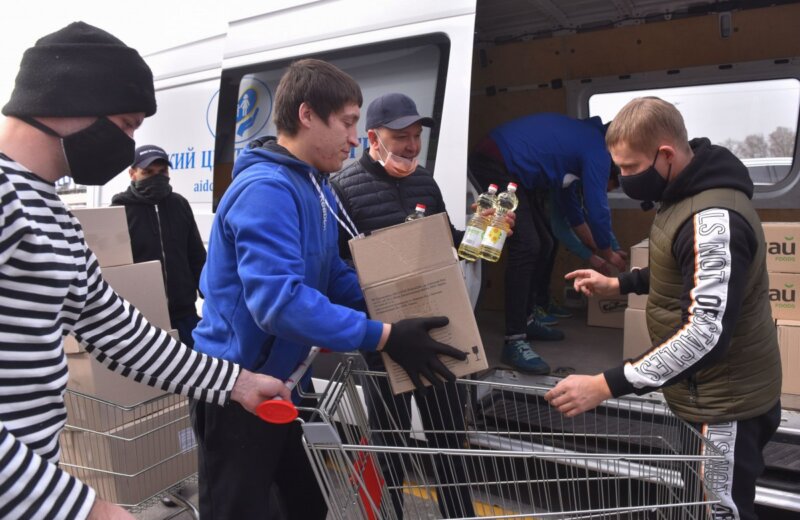They helped make the EuroMaidan and the Orange Revolution possible. They brought Ukraine’s army back from the brink in 2014.
Now, volunteers and businesses are organizing a massive countrywide effort to help Ukraine battle against the COVID-19 pandemic.
Tens of thousands of people are donating money and time to help acquire protective supplies for doctors, helping drive medical workers, organizing food deliveries to at-risk populations and supporting people who have lost their jobs.
“This reminds me of the situation in 2013, when we had the EuroMaidan and then we had to help the army,” said Inna Ivanenko, the director of the advocacy and charity nonprofit Patients of Ukraine.
The EuroMaidan Revolution ended Viktor Yanukovych’s presidency in 2014, while the earlier Orange Revolution stopped him from coming to power in a rigged 2004 election. This time the struggle is different.
“The government is doing something, but it can’t effectively fight the epidemic,” Ivanenko said. “So businesses and volunteers have joined up in full strength.”
Helping doctors
Patients of Ukraine has been building a bridge between those who want to help and those who need the help – mainly, medical workers, who are severely undersupplied. Thanks to donations from businesses, individuals and people in the diaspora, the nonprofit raised almost Hr 1 million ($36,000) in just over a week.
“We understood in the beginning of the epidemic that there was no coordinating center that could help businesses that wanted to help understand where to direct their help and what needed to be acquired,” said Ivanenko.
By working with 122 volunteers on the ground in different cities, Patients can identify which hospitals need what equipment and relay that information to donors. Some donors directly acquire equipment, others – give money to the nonprofit, which makes its own acquisition.
They have also participated in several partnerships. One project with Banda advertising agency challenged people to get haircuts at home, then donate the money they saved and post pictures on social media, challenging others to do the same. Soon, the organization will work with celebrities to raise awareness and increase donations.
The money largely goes to personal protective equipment (PPE), such as suits, respirators and masks, of which there is a global shortage. It costs at least $5,000 to cover the PPE needs of just one hospital for just one month.
Ivanenko also said that Ukrainian diaspora mobilized to help the country through donations.
NOVA Ukraine, for example, a U.S. non-profit organization, was hoping to collect an initial $6,000 through its fundraiser for Ukraine but has raised more than $40,000 and is on target for $100,000. NOVA is working with Patients and other organizations.
“Many of us come from big and medium companies here in Silicon Valley,” said Yulia Zi, who helps the partnership between the nonprofits. “So we are deploying the best practices from the business world into this project.”
Awareness is spread by inviting friends, working with online influencers, corporate matching, and linking up with other diasporas. NOVA has been working closely with Ukrainians in Canada to raise money as part of its Protect Ukrainian Doctors from Coronavirus campaign.
Any hospital that requires protective gear should register online to be connected with donors or supplies.
Directing volunteers
But help is not limited to medical workers. Ukrainian Volunteer Service has assembled a COVID-19 center to match people who need help with those who can provide it. People can either volunteer or request aid for just about any problem resulting from the epidemic, from food and money to equipment and emotional support. The service also has a hotline.
For example, at-risk populations such as the elderly, as well as disabled people and families who lost their incomes can be matched with people who can buy or prepare meals for them.
“During a crisis, volunteer initiatives emerge,” said Illia Poltavets, the program coordinator at Ukrainian Volunteer Service. “For us, this was very much expected.”
A veritable army of 12,000 volunteers works across Ukraine but is most active in Kyiv, Kharkiv, Zaporizhia and Odesa. Up to 80 requests for aid come through every day via the website and the hotline.
Supporting those at-risk
Still others have launched their own initiatives. Andrii Pavlov has put together no-covid.org.ua, a network to provide doctors with free transportation by matching them with drivers.
The network also compiled a database of state doctors and is optimizing the routes volunteer drivers take, for the most efficient transportation that uses as little fuel as possible. However, Pavlov said that volunteer drivers can’t solve this problem alone and the government must get involved.
While some doctors have been able to benefit from free transportation by companies and volunteers, social workers who work with vulnerable isolated elderly people have had it worse. With public transport significantly curtailed, social workers have faced steeper challenges to reach the people that they help.
“Social service workers are some of the most underappreciated,” said Varvara Serdiukova, of the charity fund Starenki. Each social worker serves a dozen people and they are often a pensioner’s only point of contact with the world.
Starenki supports both the elderly and the people who help them and has been doing so since 2017. The organization has brought 1,191 food parcels to at-risk people in March, which is a threefold increase from previous months. It also provided social workers with protective gear and mobilized drivers to help them visit their charges.
Since the start of the quarantine, public attention to the problem has increased and the number of volunteers working with the organization has almost doubled. In the past month, over 50 volunteers helped Starenki fulfill its mission. The nonprofit is working in Kyiv, Lviv and Dnipro but wants to expand its work to smaller cities and help more isolated elderly people.
“The way you are feeling in isolation right now is the way these people are feeling all the time,” said Serdiukova.



